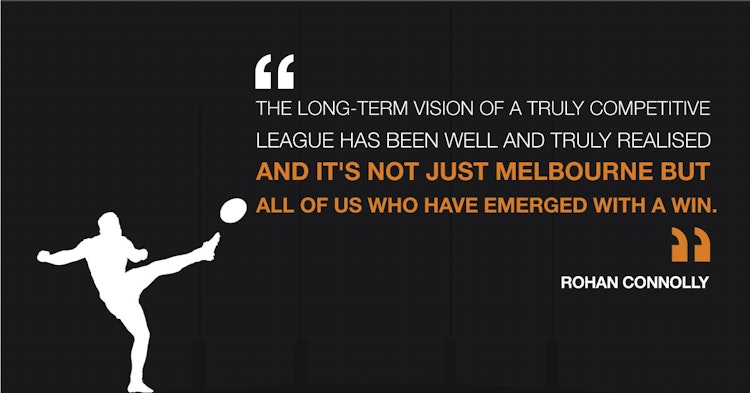Maybe The AFL Was Right About Their Equalisation Policies After All?
Last updated: Sep 27, 2021, 6:23AM | Published: Sep 27, 2021, 5:06AM
The AFL circus seldom stops for a moment these days.
No sooner had Melbourne begun to celebrate the breaking of a 57-year premiership drought on Saturday evening than focus had begun to shift towards the looming post-season trade frenzy.
AFL headquarters, though, has shut down until next Monday, when that trade period officially commences, allowing some pretty overworked staff at least a few days respite.
They’ll no doubt reflect at least briefly upon the logistical miracle just completed which was the 2021 season.
For a second year against the backdrop of the COVID pandemic, and even more uncertainty in terms of venues and scheduling, we’ve this time completed a full season of full-length matches. Remarkable, really, and something for which those responsible deserve high praise.
That shouldn’t be the only source of vindication for the AFL, however. Because Saturday’s grand final, aside from throwing up one of the more romantic pairing of teams we’ve seen, also was a big tick for some other initiatives played out on the field.
RELATED: Why Has The AFL's TV Product Turned Into A Jockfest?
The “man on the mark” rule introduced this season didn’t produce higher scoring across the board. Indeed, average scores per team declined again this year to just 79 points.
But it did absolutely produce a lot more corridor football and end-to-end play which made for a more entertaining spectacle, which on reflection, was probably more important even than any resultant scores.
We saw plenty of that in the grand final, but also one of the most stunning testimonies for the 6-6-6 rule introduced in 2019, during Melbourne’s amazing third-quarter turnaround.
In the Demons’ incredible burst of seven goals in under 16 minutes which turned a 19-point deficit into a four-goal three-quarter time lead, no fewer than four came directly from centre bounce clearances, Norm Smith medallist Christian Petracca absolutely lethal in setting up Bayley Fritsch, Ben Brown and Tom Sparrow for goals, Luke Jackson sending Clayton Oliver away for another.
Would any of them have occurred without the still-newish rule? The Western Bulldogs certainly would have had far more scope to build at least some sort of defensive wall between the back of the centre square and the scoring zone, where now, their defenders were temporarily stuck.
The biggest statement on Saturday aside from that made so dramatically by the Melbourne Football Club, however, had to be regarding AFL football’s equalisation measures of a salary cap and draft now in place for more than 35 years.
There’s been regular moments over that journey that various pundits and the public have questioned the effectiveness of the system. But the numbers don’t lie, particularly since the one-time VFL officially was named a national competition in 1990.
In the 27 seasons now from 1995-2021, no fewer than 14 different teams have won premierships, an average of more than one different club every two seasons.
Of the four who haven’t – Fremantle, Gold Coast, GWS, and St Kilda – two, the Suns and Giants have been part of the competition for just 11 and 10 seasons respectively, and even in that time the Giants have made it to a grand final.
The Dockers and Saints, meanwhile, have both memorably come oh-so-close to joining that list of 14 different premiers, Fremantle falling just 15 points short of Hawthorn in 2013, St Kilda losing by only 12 points to Geelong in 2009 and the following year only after a draw and replay against Collingwood.
Indeed, the most impressive statistic of the lot probably concerns grand final day. Since 1998, when Adelaide won the second of its back-to-back flags against North Melbourne, every team bar Gold Coast has played in the premiership decider, 17 out of 18 clubs in a span of only 24 seasons. And all of those same clubs have at least managed a finals appearance in just the last nine years.
Think for a moment of all the football fairytales written over the last 16 years. There’s the Swans’ smashing of a 72-year flag drought in 2005, Geelong breaking a 44-year run of outs in 2007. There’s the Bulldogs’ second-ever flag and first for 62 years in 2016, Richmond’s first for 37 years in 2017, and now Melbourne.
RELATED: What Each Of The Other 16 Clubs Can Learn From The 2021 Grand Finalists
Other major sports globally might have similar moments, like baseball’s Boston Red Sox in 2004 breaking the “Curse of the Bambino” which had hung around them for 86 years, or Leicester City, a relative minnow, incredibly winning the English Premier League in 2015-16. But there can’t be another sport which has served them up so regularly as has the AFL in the 21st century.
Equalisation policies in our game have not only saved clubs’ very existence on occasion, but literally given everyone a chance of success. And that sense of hope is a powerful force in keeping the flame alight for fans.
It sustained Melbourne, too, over some of the grimmest times in the club’s history not all that many years ago. And now look at the pay-off.
The long-term vision of a truly competitive league has been well and truly realised. And despite the flak they inevitably cop, some recent rule changes have improved the quality of the game. And from those, it’s not just Melbourne, but all of us, who have emerged with a win.
*You can read more of Rohan Connolly’s work at footyology.com.au
Did you enjoy this article? Join our free mailing list to get the best content delivered straight to your inbox, or join the conversation by leaving a comment below or on the Stats Insider Twitter or Facebook page.



